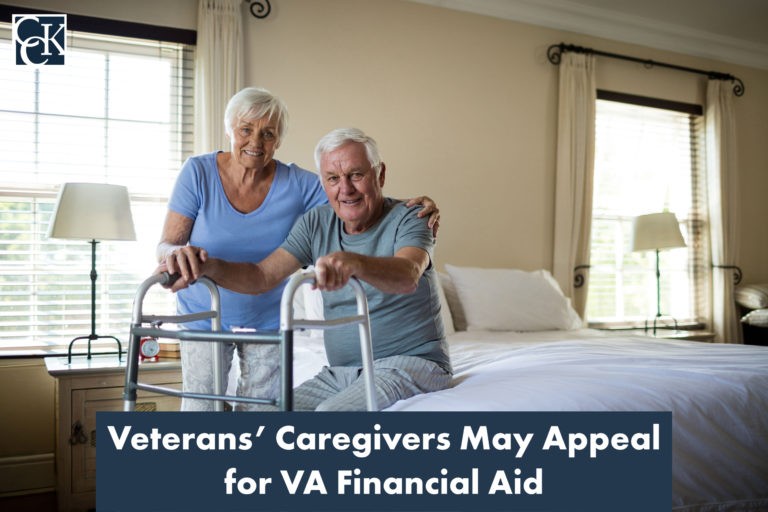Veterans’ Caregivers May Appeal for VA Financial Aid

CCK Law: Our Vital Role in Veterans Law
A new court ruling may allow thousands of caregivers who were denied financial aid by the Department of Veterans Affairs to appeal the decision. This could mean more options for families who feel they were unfairly rejected from the Caregiver Program.
What is a Caregiver?
Caregivers play an important role in the health and well-being of veterans. Typically, caregivers are spouses or family members who leave their jobs to care for a veteran full-time due to the extent or nature of that veteran’s disability. Common disabilities that can require full-time care include, but are not limited to, traumatic brain injuries (TBI), post-traumatic stress disorder (PTSD), and other disabilities such as loss of limbs.
In 2010, Congress established the Program of Comprehensive Assistance for Family Caregivers (Caregiver Program) to provide financial assistance to caregivers of seriously injured combat veterans. Specifically, the Caregiver Program offers these caregivers monthly compensation, medical training, healthcare benefits, and respite from their duties.
Despite these efforts, however, many caregivers still lack resources and access to necessary VA benefits. Until last fall, the Caregiver Program was only open to veterans who were injured on duty after 9/11. Congress expanded the group to include veterans who served before May 1975 in October 2020, and the program is set to expand again in the next few years to encompass veterans of all eras.
Court Rules in Favor of Veterans and Their Caregivers
A recent ruling by the Court of Appeals for Veterans Claims in April 2021 may offer caregivers of seriously wounded veterans who were previously denied benefits from VA the chance to appeal.
The ruling comes out of a claim filed by a Marine Corps Veteran who, after several combat tours in Iraq and Afghanistan, was left legally blind and suffering from traumatic brain injury. As a result of these injuries, he was rated 100 percent disabled by VA. However, when the Veteran’s spouse applied for benefits through VA’s caregiver program, she was denied. Her attempts to appeal this decision through various department officials were also denied.
The family and their lawyers argued that they should be able to appeal the denial to the Board of Veterans’ Appeals, which handles other benefits disputes, despite VA’s stance that this would be an unnecessary and complicated step. The Court sided with the Veteran, ordering that cases such as his should be allowed to go before the BVA. Further, the Court instructed department officials to spend the next 45 days working with the outside attorneys to develop a list of applicants from the last 10 years who may be owed another chance at appeal.
Future Impact of Court Ruling on Caregivers
This ruling has the potential to award tens of thousands of dollars to families that have struggled to act as full-time caregivers to veterans. Successful appeals before the Board could mean not only future compensation for veterans and their families, but also retroactive benefits, depending on the specific circumstances of each case. However, the ruling could potentially lead to slower appeals timelines. In addition, it would likely be months or years before caregivers receive benefits, depending on whether VA officials decide to appeal the Court’s ruling.
About the Author
Share this Post
